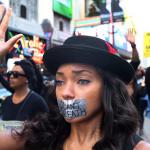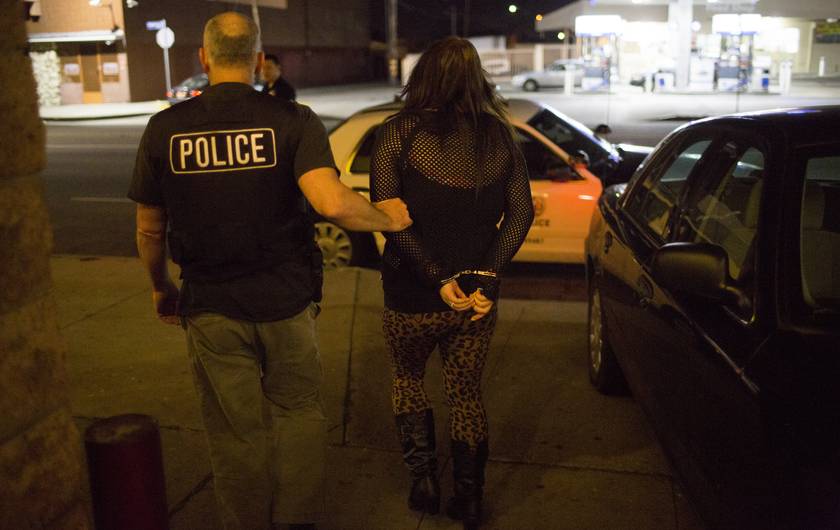While We Focus on Shootings, We Ignore Victims of Police Sexual Assault

On Feb. 10, 2013, 31-year-old sheriff's deputy Cory Cooper pulled over a 19-year-old woman and her boyfriend in Omaha, Nebraska. After finding marijuana in the vehicle, Cooper ordered the boyfriend to toss the drug in the nearby Zorinsky Lake, according to the Omaha World-Herald. While the man was away, Cooper allegedly told the young woman to follow him back to his cruiser, where he asked her to remove her shirt.
The request was reportedly an ultimatum presented to the young woman to keep her boyfriend out of trouble. Cooper then exposed himself.
"All I could think was, 'What am I going to do to get out of this?' Nobody's going to believe me over the police," the victim told the World-Herald.
On April 15 of this year, Cooper took a plea deal that will allow him to escape a felony conviction. Despite the traumatizing nature of his crime, he will be served with misdemeanor charges of assault and attempted evidence tampering. He will serve a year in jail but won't have to register as a sexual offender. He still has law enforcement certification, though the World-Herald reports that will likely be stripped soon.
This type of sexual violence by police is more common than it would seem. In fact, though now-familiar scenes of civilians, mostly black men, being beaten, shot or choked by law enforcement have rightly provoked the ire of the American public, sexual misconduct is the nation's second most reported allegation of officer misconduct, according to a 2013 report by the Cato Institute. Nevertheless, broad narratives of police brutality tend to ignore both female victims and the often specific nature of the violence leveled against them in favor of focusing on the highly visible use of weapons to kill men.
"Safety, in light of police brutality, means organizing against racial-sexual violence," community organizer Ahmad Greene-Hayes, who works with Black Lives Matter: NYC and Black Women's Blueprint, told Mic. "Police officers can be killers, but they can also be rapists."
Women are subject not only to differential forms of violence by police, but also to entrenched stereotypes surrounding sexual assault, which may further inhibit their seeking justice for this abuse. Anti-sexual assault advocates have long argued law enforcement fails to adequately protect and serve survivors of assault. As such, "women too often find themselves at the mercy of police agencies that neglect women's safety, whether by ignoring women's allegations of abuse by an officer or making light of crimes reported by women," Deborah Jacobs, a consultant in gender and race policy and police practices, told Mic via email.
This issue may be multiplied for "black women with the least [economic and social] privilege, who live in the most dangerous situations," University of Illinois professor Beth E. Ritchie writes in her book Arrested Justice: Black Women, Violence, and America's Prison Nation. Instead, these women "are criminalized instead of being are supported."
"Police officers can be killers, but they can also be rapists."
Indeed, the force of blue-on-pink violence is compounded by racism and racial disparities within the criminal justice system. The lifetime rate of rape and attempted rapes is higher for black and mixed-race women than it is for white women, and black women were incarcerated at 3.75 times the rate of white women in 2008, according to the Women's Prison Association. Given such an environment, one could reasonably conclude that women of color may be subject to disproportionate rates of sexual violence from law officers.
This collusion of sexual assault, racism and state-sanctioned violence has intimately affected black women's lives. In his 2010 book on police brutality, for example, author Leonard Moore details the story of a 23-year old black woman who was the victim of an alleged sexual assault by three white police officers in New Orleans in 1959. Moore writes that the victim "identified her attacker [at the arraignment trial] and testified that he removed her pants and raped her and that she did not scream and yell because no one was around and because she had been afraid of police since she was a child." The all-white jury acquitted the three officers.
The issue no doubt has roots in the history of slavery and segregation, and the subsequent social denial of black women's bodily autonomy. "In the segregated American South, a white man could rape a black woman with little fear of legal or social recourse, and black women lived in a persistent state of apprehension," Sheri Parks wrote in the Washington Post.

Los Angeles Police Department Vice Squad In South Central Los Angeles
Source: Robert Nickelsberg
This pattern of racialized sexual assault committed by police continues today. Less than a year ago in Oklahoma City, in August 2014, former police officer Daniel Ken Holtzclaw was arrested on multiple charges, including sexual battery, rape and forcible oral sodomy. All seven of his victims, aged 34 to 58, were black women. Yet there has been no nationwide cry for justice for these horrific crimes.
"In the same places where police-involved shooting deaths of black cisgender men take place, black cisgender and transgender women are pummeled to death, gunned down, sexually harassed and raped," Greene-Hayes told Mic. "However, our movements have only focused on the former. Historically, we have paid more attention to the effects of lynching, for example, for black men, only to deny that black women were also lynched and that there was and continues to be a sexual dimension undergirding white supremacy."
One reason sexual misconduct cases may occur without the same outcry as that against gun violence is the public's unwillingness to recognize women as victims of police misconduct in the first place. But the silence that results when women are sexually victimized also reflects the more insidious problem of rape culture. Slut shaming and victim blaming are common practices reflecting our society's belief that women are at fault for the violence committed against them. Within a culture that views women's bodies as not belonging fully to themselves, and which denies their full and equal autonomy, men in positions of power - be they police officers like Cooper or former football stars like Darren Sharper - may dehumanize and punish women by abusing their sexuality.
To be sure, this specific incarnation of police brutality is reminiscent of cases of sexual assault among athletes, fraternities or within other masculine-centered spaces. The recent viral segment "Football Town Nights" from the sketch series Inside Amy Schumer skewered the way such spaces may encourage either abuse of power or lack of broader social response in its wake.
Perhaps less commonly, sexual misconduct also impacts boys and men. A 16-year-old named Darrin Manning was picked up by police in January 2014. As he and his friends walked from the subway, police told the Philadelphia Inquirer, one of his schoolmates "caught the attention" of the officers. The students ran, and Manning was apprehended. During a "pat-down," a female officer groped Manning so violently his testicle ruptured, according to the Inquirer.
Certainly, there is a need for the public to insist "Hands Up! Don't Shoot" in the presence of officers. But it's just as important to insist that raised arms are not a sign welcoming sexual assault from a callous officer who doesn't care about the bodies and humanities of women.
So how to fight back? "To stop unfit officers from moving from one department to another, most states can decertify officers who engage in misconduct, curbing mistreatment of women," Jacob said. "Studies of decertification both in Florida between 1976 and 1983 and in Missouri in 1999 found that sexual abuse of women was the most frequent reason for decertification in cases involving public, official misconduct."
We won't be able to stop this specific strain of violence until we first commit to tackling the sexism embedded in American culture. We must insist that violence against women matters because women's bodies and sexual autonomy matter - despite an apparent insistence they don't.
[Darnell L. Moore is a Senior Editor at Mic.]
